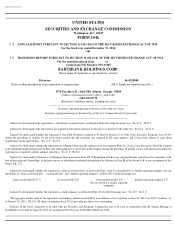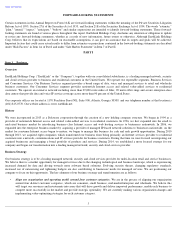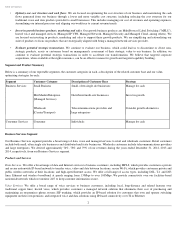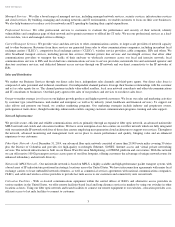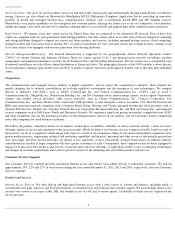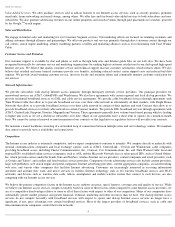Earthlink 2014 Annual Report Download - page 12
Download and view the complete annual report
Please find page 12 of the 2014 Earthlink annual report below. You can navigate through the pages in the report by either clicking on the pages listed below, or by using the keyword search tool below to find specific information within the annual report.
Table of Contents
Incumbent carriers, which are telephone companies that held monopoly local telephone service franchises before the Telecommunications Act of
1996, or their successors in interest, are subject to additional duties. These include obligations of incumbent carriers to:
Collectively, these requirements recognize that local telephone service competition depends on cost-based and non-
discriminatory
interconnection with, and use of, some elements of incumbent carrier networks and facilities under specified circumstances. Failure to achieve
and maintain such arrangements could have a material adverse effect on our ability to provide competitive local telephone services.
FCC rules define the scope of the facilities that incumbent carriers must make available as UNEs to competitive carriers such as us at rates based
on the Total Element Long Run Incremental Cost, or TELRIC, standard. Incumbent carriers must offer access to their copper loops and subloops
in all areas, until they choose to retire them, but must offer access to certain higher-
capacity DS1 and DS3 transmission facilities only in wire
center serving areas with relatively few business lines and collocated competitive carriers, as defined by detailed FCC regulations. In general,
incumbent carriers are not required to offer DS1 and DS3 transmission facilities and interoffice fiber optic facilities as UNEs in relatively large
wire centers or wire centers deemed to already be “competitive”
based on FCC standards. Incumbent carriers are also not required to offer
optical speed transmission facilities or packet-
switched facilities as UNEs. Further, incumbent companies are not required to provide local
switching as a UNE, which means that we cannot rely on the Unbundled Network Element-Platform, or UNE-
P, to provide local services to
customers at TELRIC-
based rates. In some circumstances, AT&T, Verizon and other incumbent carriers are making available some of these
facilities and services, either as lightly regulated special access services or under unregulated “commercial agreements,”
at prices significantly
higher than TELRIC.
Interconnection Agreements
. Under the Communications Act, incumbent carriers are required to negotiate in good faith with competitive
carriers such as us regarding terms for interconnection, collocation, reciprocal compensation for local traffic and access to UNEs. If the
negotiating carriers cannot reach agreement within a prescribed time, either carrier may request binding arbitration of the disputed issues by a
state regulatory commission. In addition, competitive carriers are permitted to “adopt”
in their entirety agreements reached between the
incumbent carrier and another carrier during the initial term of that agreement.
An interconnection agreement typically has a term of three years, although the parties may mutually agree to extend or amend such agreements.
We operate under interconnection agreements with AT&T, CenturyLink, Fairpoint Communications, Frontier Communications, Verizon and
Windstream. Our retail operating companies each maintain interconnection agreements with the incumbent in each state and service territory
within which we purchase UNEs. We expect, but cannot assure, that each new interconnection agreement to which we are or will be a party will
provide us with the ability to provide service in a state on a reasonable commercial basis. Many of our interconnection agreements provide either
that a party is entitled to demand renegotiation of the entire agreement or particular provisions thereof based on intervening changes in law
resulting from ongoing legal and regulatory activity, or as a result of an immediately effective change in law, in which case the agreement will
be resolved pursuant to a dispute resolution process if the parties do not agree upon the impact of a change in law. The initial terms of many of
our interconnection agreements with AT&T, Fairpoint and Verizon have expired; however, each of our expired agreements contains an
“evergreen”
provision that allows the agreement to continue in effect until terminated. New agreements could result in less favorable rates, terms
and conditions than our prior agreements.
If we cannot negotiate new interconnection agreements or renew our existing interconnection agreements in each state on acceptable terms, we
may invoke our ability to seek binding arbitration before state regulatory agencies. The arbitration process, which is conducted on a state-by-
state basis, can be costly and time-
consuming, and the results of arbitration may be unfavorable to us. If we are not able to renegotiate or enter
into interconnection agreements on acceptable terms, or if we are subject to unfavorable arbitration decisions, our cost of doing business could
increase and our ability to compete could be impeded. Moreover, our
7
•
establish reciprocal compensation arrangements for the completion of telecommunications service calls originated by customers of
other carriers, which the FCC has interpreted to include bill and keep (a pricing arrangement under which each carrier terminates calls
from the other at no charge);
•
permit the resale of their services;
•
permit users to retain their telephone numbers when changing carriers; and
• provide competing carriers access to poles, ducts, conduits and rights-of-
way at regulated prices.
• offer interconnection at any technically feasible point in their networks on non-discriminatory, cost-
based terms;
• offer collocation of competitors' equipment at their premises on a non-
discriminatory basis;
•
make available some of their network facilities, features and capabilities, referred to as Unbundled Network Elements, or UNEs, on
non-discriminatory, cost-based terms; and
•
offer wholesale versions of their retail services for resale at discounted rates.


